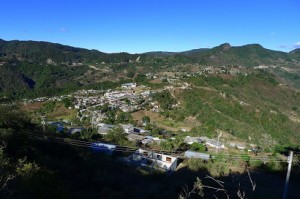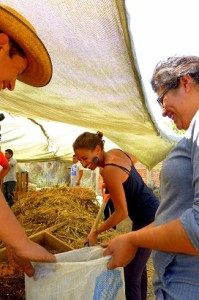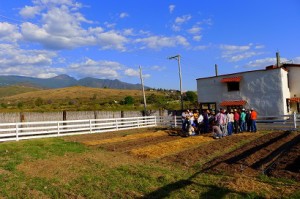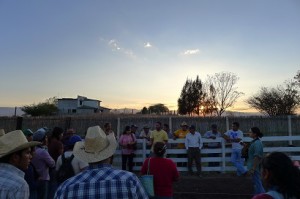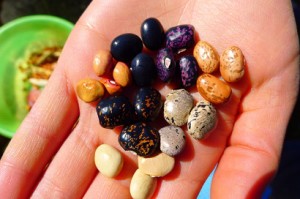 If one were tempted to romanticize and essentialize indigenous life in Oaxaca, Santo Domingo del Estado, a Triqui community etched into the mountains of the Mixteca region, would be such a place to indulge oversimplification. Close to 8000 feet above sea level, the chilly mountain air left clear skies for shows of stars, brilliant sunrises, and little protection from the powerful sun. We spent a few days there as guests of Josefino Martinez, affectionately called Profesor by his community. An elder responsible for establishing an ambulance service, reading library, seed bank, women´s permaculture garden network, regional Triqui radio, and the town´s water supply. The women all wear the traditional dress, an intricately woven huipil, each having crafted her own over one month by hand. Triqui is spoken, not Spanish. All land is still collectively owned through the indigenous governance structure called Bienes Communales. The 16 towns that comprise the Triqui region have persisted after
If one were tempted to romanticize and essentialize indigenous life in Oaxaca, Santo Domingo del Estado, a Triqui community etched into the mountains of the Mixteca region, would be such a place to indulge oversimplification. Close to 8000 feet above sea level, the chilly mountain air left clear skies for shows of stars, brilliant sunrises, and little protection from the powerful sun. We spent a few days there as guests of Josefino Martinez, affectionately called Profesor by his community. An elder responsible for establishing an ambulance service, reading library, seed bank, women´s permaculture garden network, regional Triqui radio, and the town´s water supply. The women all wear the traditional dress, an intricately woven huipil, each having crafted her own over one month by hand. Triqui is spoken, not Spanish. All land is still collectively owned through the indigenous governance structure called Bienes Communales. The 16 towns that comprise the Triqui region have persisted after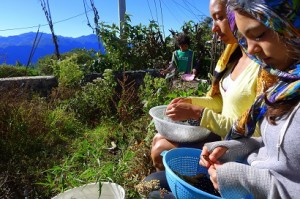 literally having been bombed by the Mexican government for their insistence to maintain their autonomy and land. Yet, perhaps the most telling moment of our stay was observing a 12-year old girl dressed in her patterned huipil as she sat in the satellite internet shop and watched youtube videos about German zombies. As with most of the other youth, her parents can expect her to leave the community to pursue an education in the City, and likely not return.
literally having been bombed by the Mexican government for their insistence to maintain their autonomy and land. Yet, perhaps the most telling moment of our stay was observing a 12-year old girl dressed in her patterned huipil as she sat in the satellite internet shop and watched youtube videos about German zombies. As with most of the other youth, her parents can expect her to leave the community to pursue an education in the City, and likely not return.
The 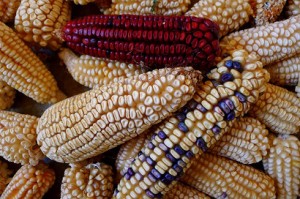 depopulation of the pueblos seems to us a recurring story. Yet Josefino remains equanimous, ¨It´s not good or bad, just reality.¨ Other community leaders we respect deeply, Jutta from Ideas Comunitarias, and Kiado and Oliver from SURCO have helped us develop a similarly honest perspective on the complexities of pueblo life. A system of imposed voluntary service (cargos) maintains community institutions and functionality, but also can be a migratory push factor as those same volunteers have to recoup losses of income sustained during their service. Traditional subsistence agriculture (mipla) is the very fabric of rural community, and yet the work is physically demanding and does not integrate well into the cash economy that has permeated the far reaches of the state.
depopulation of the pueblos seems to us a recurring story. Yet Josefino remains equanimous, ¨It´s not good or bad, just reality.¨ Other community leaders we respect deeply, Jutta from Ideas Comunitarias, and Kiado and Oliver from SURCO have helped us develop a similarly honest perspective on the complexities of pueblo life. A system of imposed voluntary service (cargos) maintains community institutions and functionality, but also can be a migratory push factor as those same volunteers have to recoup losses of income sustained during their service. Traditional subsistence agriculture (mipla) is the very fabric of rural community, and yet the work is physically demanding and does not integrate well into the cash economy that has permeated the far reaches of the state.
So, needless to say, I was struck to the point of tears when I asked an auditorium packed with 20-somethings how many desired to return to their pueblos to work the land alongside their grandparents and almost all raised their hands. I was giving a talk about our farm and food 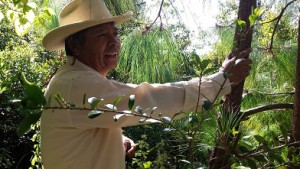 sovereignty at the Technological Institute of Valles Centrales and fell into the warm, inquisitive embrace of this learning community, bent on maintaining and improving their agricultural traditions. If they are not feigning interest, I think we will have to create a special farmer immersion training in Spanish just for these eager young folks committed to the revival of pueblo life and desiring to learn on our land.
sovereignty at the Technological Institute of Valles Centrales and fell into the warm, inquisitive embrace of this learning community, bent on maintaining and improving their agricultural traditions. If they are not feigning interest, I think we will have to create a special farmer immersion training in Spanish just for these eager young folks committed to the revival of pueblo life and desiring to learn on our land.
We are understanding in a new way that wherever we go, we bring ourselves. Complexity persists and at times we are grumpy, stressed, elated, confused, touchy… and now usually BUSY. (Ah, patterns.) We have been blessed with numerous invitations to share our experiences with activists 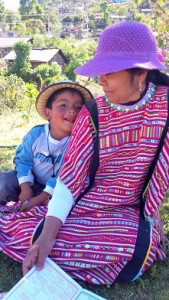 here. We offered a workshop on youth empowerment to a group of community organizers from Puente de la Salud Comunitaria and Ideas Comunitarias. We shared some of our favorite SFF tools for building relationships and generating ideas – Theater of the Oppressed, paired storytelling, sacred object sharing, identity group panels, and gratitude circles. The Puente team said it was the
here. We offered a workshop on youth empowerment to a group of community organizers from Puente de la Salud Comunitaria and Ideas Comunitarias. We shared some of our favorite SFF tools for building relationships and generating ideas – Theater of the Oppressed, paired storytelling, sacred object sharing, identity group panels, and gratitude circles. The Puente team said it was the 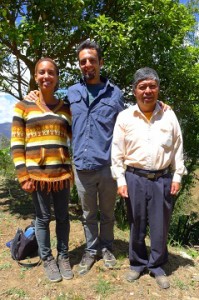 first time they saw their director play! We also presented a workshop on the Black Lives Matter movement at Unitierra with dear compas Taina and Angelica skyping in from Albany, NY for the discussion. AgroSano, a collective dedicated to advancing biointensive growing method invited us to support them in a 3-day workshop. We were delighted to have our hands in the worm castings and our minds on plant spacing. It was truly beautiful to realize that after 20 years of farming (Leah) and 17 years (Jonah) we still get nerdy excited about the subtleties of mulch timing and depth, plant spacing, and how the callouses on our hands are permanent reminders of our commitment and love to working with the land.
first time they saw their director play! We also presented a workshop on the Black Lives Matter movement at Unitierra with dear compas Taina and Angelica skyping in from Albany, NY for the discussion. AgroSano, a collective dedicated to advancing biointensive growing method invited us to support them in a 3-day workshop. We were delighted to have our hands in the worm castings and our minds on plant spacing. It was truly beautiful to realize that after 20 years of farming (Leah) and 17 years (Jonah) we still get nerdy excited about the subtleties of mulch timing and depth, plant spacing, and how the callouses on our hands are permanent reminders of our commitment and love to working with the land.
The opportunities and obligations from home persist as well. Just since the last love notes, Leah was 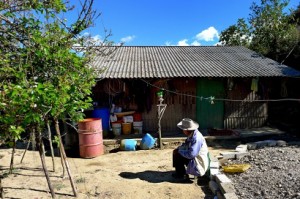 interviewed for the Marc Steiner show, Occupy TV, Solutions Journal, and Seedstock and further committed to give keynotes at an Environmental Justice conference and Bioneers. Perhaps the most random request was for our lives and family to be the central cast in a new reality tv show – this from the producers of New Jersey Housewives. Seriously.
interviewed for the Marc Steiner show, Occupy TV, Solutions Journal, and Seedstock and further committed to give keynotes at an Environmental Justice conference and Bioneers. Perhaps the most random request was for our lives and family to be the central cast in a new reality tv show – this from the producers of New Jersey Housewives. Seriously.
Neshima and Emet are engaging new passions. They started weekly pottery lessons with Julia Ruiz, an artisan in Atzompa, who has been kind enough to welcome us into her home and life. Each week they spend a couple of hours copying her motions as she hand-builds exquisitely even, balanced, strong, and intricate pots and sculptures. She works with a sandy clay from nearby land and fires her pieces once every couple of weeks in her own clay, wood-fired oven. By the time Julia was 12, she already knew the art well, but her own 12-year-old daughter has other interests. She smiles warmly at our kiddos, eager to please her with their attempts (sometimes successful) to craft bowls and 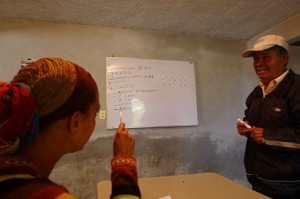 grasshoppers. Emet has found a true love of reading – not just Star Wars and Diary of a Wimpy Kid – but real books. He finished the first novel in Ursula LeGuin´s classic trilogy, Wizard of Earthsea, and was positively leaping with delight about the brilliance of the final chapter. Neshima is impassioned by maize. She started making her own tortillas from scratch, cooking the maize in limestone, soaking, dehulling, pressing and cooking. She carries her ball of masa whenever we go to visit friends so she can provide fresh tortillas. We had to convince her not to also carry the 20-pound metal press everywhere she goes, teaching her instead that generations ago they used nothing more than their hands.
grasshoppers. Emet has found a true love of reading – not just Star Wars and Diary of a Wimpy Kid – but real books. He finished the first novel in Ursula LeGuin´s classic trilogy, Wizard of Earthsea, and was positively leaping with delight about the brilliance of the final chapter. Neshima is impassioned by maize. She started making her own tortillas from scratch, cooking the maize in limestone, soaking, dehulling, pressing and cooking. She carries her ball of masa whenever we go to visit friends so she can provide fresh tortillas. We had to convince her not to also carry the 20-pound metal press everywhere she goes, teaching her instead that generations ago they used nothing more than their hands.
Two dear ones passed away recently. Please hold in your hearts the spirit of Ed Coolidge and his family. He was a TVHS colleague, Soul Fire CSA member (always the first on the signup list), friend, artist, forest-lover, and tinkerer who was taken too soon by brain cancer, leaving behind adoring students, sister, parents, and an infant son. We miss Ed and pray for his peaceful transition to the world of the ancestors.
After 91 years well lived, our friend and shero, the Original Gangster of black farmer activists, Juanita Nelson passed on. She lived off the land in MA and was a war tax resister and founder of the PeaceMakers. When I am busting my butt over the next weeks and months to actualize Ayiti Resurrect and the Black and Latino Farmers Immersion, I will be holding her work and life´s mission in my consciousness.
Amidst it all, it has been important, even essential, to notice that Nature is amazing. You know this of course – but its so good to just let in the fact that She makes immense petrified waterfalls with warm mineral pools, cacti taller than pines trees, thunderstorms that punish the ground after months without even a drop of rain, red worms that copulate and both ge t pregnant at the same time, frijol varieties that make 6 unique color patterns from the same seed stock, and LOVE. She makes LOVE so we can have each other, need each other, and cry over each other.
t pregnant at the same time, frijol varieties that make 6 unique color patterns from the same seed stock, and LOVE. She makes LOVE so we can have each other, need each other, and cry over each other.

